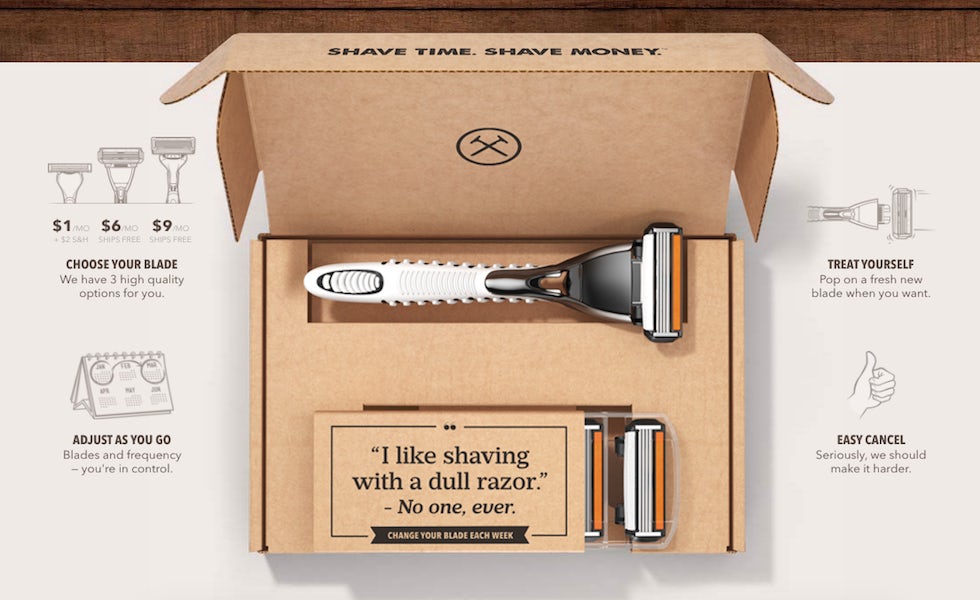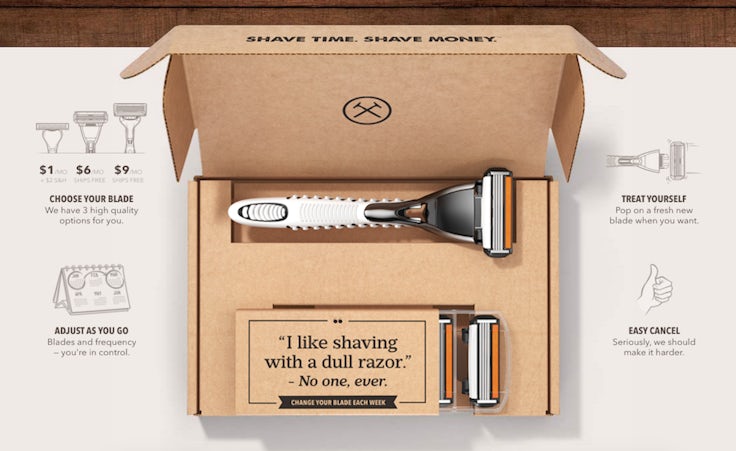Charlotte Rogers: The razor subscription market is already on the verge of saturation
With new and established brands launching shaving subscription services on what feels like a daily basis, is there room for Dollar Shave Club to crack the UK?

Subscription services are the beating heart of any successful ecosystem brand. From Amazon Prime and Netflix to Deliveroo’s £8 a month Plus service, brands in every industry are realising the importance of getting consumers to commit.
No sector has been more disrupted by the fight for subscriptions than the men’s shaving market. Innovation was once limited to the latest high-tech release from Procter & Gamble’s Gillette, but last year the shaving market exploded with the breakthrough success of online-only subscription brand Dollar Shave Club.
The business model is simple. Subscribe to have razor blades delivered to your door on a monthly basis. Users are able to leave at any time and are promised a 100% money back guarantee if they’re not happy.
Realising that not every man is interested in owning the latest high-tech razor blade, Dollar Shave Club pitched its entry level ‘Humble Twin’ blade at $1 a month (plus $2 for shipping and handling), rising to $9 for the ‘Executive’ six blade razor.
The collection has since evolved to include own-brand shaving butter, post-shave moisturiser, wipes, hair-styling products and toothpaste. Members are incentivised to introduce their friends to the service in order to gain $5 in Dollar Save Club credits.
The online razor market is hitting maturity faster than anyone – including the brands – expected.
Dollar Shave Club launched in 2012 and now accounts for 54% of the US online shaving marketing, according to Euromonitor figures, with rival Gillette claiming just a 21% share. The business model impressed FMCG giant Unilever so much that it acquired the startup for $1bn in July 2016.
Now Dollar Shave Club is finally bringing its brand to the UK. While its shaving and grooming products will not be available for purchase until early 2018, from 27 November British consumers have been able to sign up as the brand’s first UK members.
Saturation point
Despite the burgeoning product mix, irreverent brand identity and engaging social campaigns, Dollar Save Club could have waited too long to play its hand in the UK, a market already nearing saturation with online subscription men’s grooming brands.
Gillette, for example, launched its on-demand service in May, allowing customers to text for a shipment or subscribe to get every fourth order free. The collection ranges from the basic three blade Gillette Mach 3 razor to the advanced Gillette Proshield Flexball five blade razor.
US import Harry’s, meanwhile, launched in the UK in June and went big with an outdoor and digital campaign the following month, positioning itself as ‘shaving’s other guys’. For £2.95 consumers receive a handle, blade, shave gel and a travel blade cover. Following the trial, they are automatically enrolled on a subscription plan, which they can modify to fit their needs.
READ MORE: Meet Harry’s, the shaving startup taking on Gillette
Founded in 2013, Harry’s currently has three million customers in the US alone. As a trans-Atlantic loyalty push the brand encouraged its US consumers to invite their UK friends to sign up in return for early access once Harry’s launched in Britain in July.
These brands are also missing a trick by failing to create a female-focused product or overtly gender-neutral blade.
While Dollar Shave Club and Harry’s have a distinctly American identity, which could fall flat with UK consumers, Cornerstone is a British alternative founded in 2014 and built on £1m of crowdfunding. The brand, which claims to have “tens of thousands” of customers, delivers one box of razors every six to 18 weeks depending on the user’s needs, at a cost of £14. Consumers can add face scrub, shaving gel, shaving cream and a post-shave balm to their order.
And then there’s French razor brand Bic, which in November brought its own Shave Club to the UK, a subscription service of non-disposable, refillable razors. Consumers receive fresh blades on a monthly or bi-monthly based on their shaving needs.
Standing out among all this noise could prove a real challenge. As these brands fight it out on price, subscription model and overall service, they are also missing out on another potential revenue stream by failing to create a female-focused product or overtly gender-neutral blade.
The subscription-only blade brands are also vulnerable to consumer demand for electronic shaving devices. This trend was highlighted in P&G’s fourth quarter results, which showed that while organic sales in the grooming sector have fallen 1% due to “reduced pricing in shave care”, the company experienced double-digit organic sales growth for its electric shaving appliances.
Furthermore figures from data analytics company 1010Data suggest that since the Unilever acquisition Dollar Shave Club’s sales have flatlined, with customer acquisition and retention also slowing. While the brand itself dismisses these statistics, the data could suggest that the online razor market is hitting maturity faster than anyone – including the brands – expected.
Creating a distinct proposition, differentiated by branching out into gender neutral alternatives and a wider product mix, could help brands like Dollar Shave Club, Harry’s and Gillette stave off saturation and ensure that consumers on both sides of the Atlantic continue to renew their subscriptions.







